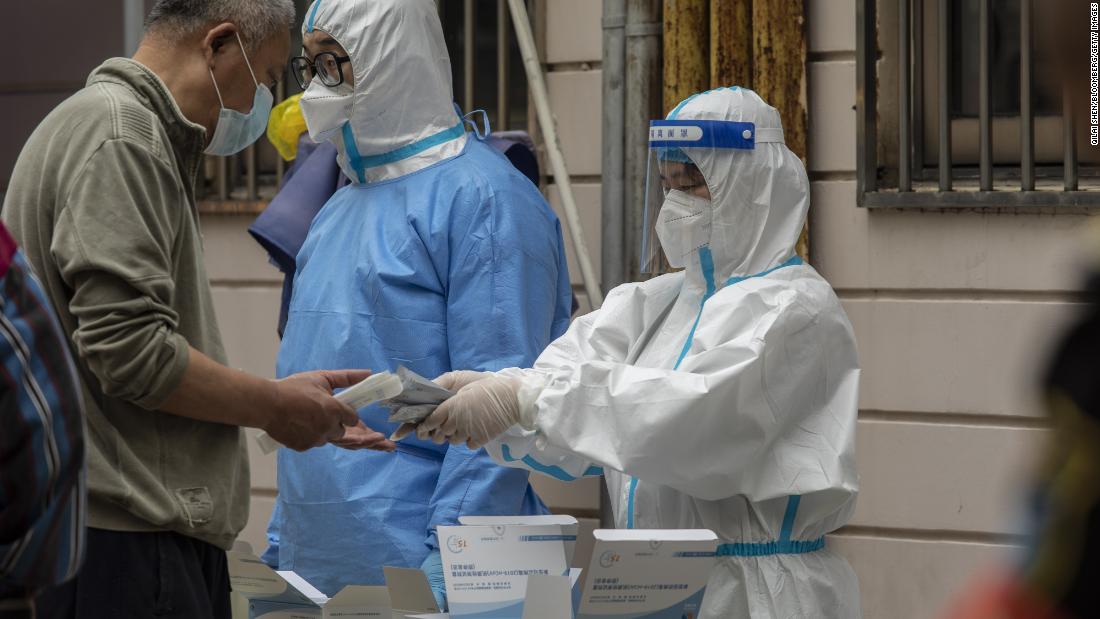
And Beijing points to the past successes of this strategy — including only two reported Covid-related deaths for all of 2021 — to burnish its claims of superiority over Western governments.
“No effort should be spared to attend every case, save every patient, and truly respect the value and dignity of every human life,” Chinese leader Xi Jinping — who has explicitly reiterated his support for the “zero-Covid” policy in recent weeks — said at a global health summit last year.
The deaths mark a new phase of loss for China as well as a high-risk political challenge.
Reporting death figures is “something of a two-edged sword for the authorities,” according to health security expert Nicholas Thomas, an associate professor at City University of Hong Kong.
“If the numbers are too low, not only is there a problem of trust, but also it will make the quarantine restrictions seem excessive. If the numbers are too high, then the lockdowns are justified but the authorities have failed to contain the virus.”
To date, government officials have prioritized the suppression of the virus over all else, even as public resentment and economic risks grow under blunt lockdown restrictions.
So far, there’s no sign of a change in policy, with Beijing instead “doubling down on its messaging of stopping the virus,” even as outbreaks spread, according to Thomas.
And as the zero-Covid policy continues to be explicitly linked to Chinese leader Xi, it’s clear “this line is going to be held for the foreseeable future,” he said.
By the numbers
As the number of deaths and severe Covid cases has risen in Shanghai in recent days, city health officials have spoken with increasing urgency about further strengthening critical care response and upping vaccination in the elderly — though lockdowns and mass testing appear to have taken priority over vaccination so far.
“We need to coordinate the city’s medical resources, increase critical medical teams … reduce the proportion of severe patients … and try our best to reduce the fatality rate,” Zhao Dandan, deputy director of the Shanghai Health Commission, said Sunday.
“Eligible elderly people should be vaccinated as soon as possible,” he said.
Now, as authorities have upheld expectations that death rates in the country will remain low, they have no choice but to rely on lockdowns to protect the vulnerable.
Counting cases
But the Hong Kong comparison also raises questions of how Shanghai has managed to keep its death rates so low.
By that rate, Shanghai should have seen as many as 700 deaths for every 100,000 cases, according to infectious diseases physician Peter Collignon, also a professor at the Australian National University Medical School.
Experts have also pointed to a lack of transparency around the criteria used by Chinese officials to classify a Covid-19 death.
“If there is no black-and-white definition for Covid deaths or Covid-related deaths or how these deaths should be reported then everything is just up to that expert panel to decide,” said Jin Dongyan, a professor at University of Hong Kong’s School of Biomedical Sciences. “That’s the reality.”
Some of these mirror concerns over whether there was a full accounting of infections and deaths during China’s initial 2020 outbreak in Wuhan, which overwhelmed hospitals — though China has defended its transparency throughout the pandemic.
China’s Foreign Ministry said in a 2020 statement: “China calculated and reported its confirmed cases and fatalities based on facts … the relatively low number of confirmed cases and deaths can be attributed to the comprehensive and strict measures taken by the Chinese government.”
But experts also warn that it’s difficult to draw comparisons between places with different testing and disease control strategies, social factors and demographics.
For example, Shanghai’s intensive testing has picked up hundreds of thousands of asymptomatic cases, some of which may have been missed in case counts in other places, potentially skewing comparisons.
Bureaucratic processes and the time it takes for positive cases to succumb to the disease can also cause reported deaths to lag, with some experts suggesting the worst in Shanghai may be yet to come.
Meanwhile, understanding the overall toll — not only of the virus — but of the lockdowns rolled out across Shanghai and other cities is critical to evaluating the true cost of China’s control measures, experts say.
Xi Chen, an associate professor at the Yale School of Public Health, said the long-term fallout from the Shanghai lockdown, including missed cancer screenings or mental health strain, will take time — and data — to become clear, and even then may be hard to measure.
“We will often look at two kinds of negative shock,” he said of the fallout past the initial burden of death. “One, for those people who died eventually, and, the other, those who survived but live with trauma attached to them.”
CNN’s Beijing Bureau contributed to this report.